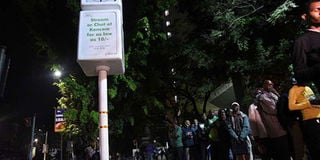Traffic jams, police brutality mark the first night of curfew

Commuters wait at Kencom bus stop in Nairobi as nationwide curfew begins, on March 27, 2020. PHOTO | EVANS HABIL | NATION MEDIA GROUP
What you need to know:
- Health Cabinet Secretary Mutahi Kagwe said it had been difficult for the government to enforce social-distancing, and hence the need for a curfew.
- Mr Mutyambai said that police officers had been directed not to rough up those arrested outside their homes.
For Kenyans aged 40 and below, or those who were not old enough to comprehend the events of the failed coup attempt in 1982, the first night of a nationwide curfew was a completely new experience.
Mombasa residents bore the brunt of police harassment, with travellers tear-gassed and even beaten up by security officers long before the curfew hour hit.
Chaos reigned around the Likoni Channel crossing, where travellers and even journalists were beaten up with batons.
NTV cameraman Peter Wainaina was also clobbered as he covered the events of the day.
Residents were left to their own devices on their way home, with some having to run all the way.
Elsewhere, Kenyans attempting to get home before the start of the curfew also faced massive transport inconveniences.
With public transport vehicles unavailable to ferry anxious commuters, there were long queues in urban centres as people scrambled to get to their homes.
PASSENGER LIMIT
Shortly before 5pm, residents scrambled to get the few available public transport vehicles.
The situation was exacerbated by an earlier order compelling PSVs to carry fewer passengers so as to maintain the required social distance.
Fares shot up by more than 100 per cent. With PSVs also banned from ferrying passengers at night, it was everyone for themselves.
The rush caused a massive traffic jam on all roads out of Nairobi, with many motorists spending up to two hours on the road.
Interior Cabinet Secretary Fred Matiang’i, who earlier met with police commanders from Nairobi and neighbouring divisions, said city residents had no excuse to be outdoors at night, sentiments that had been reiterated by Inspector-General Hillary Mutyambai and Health Cabinet Secretary Mutahi Kagwe.
Urban centres were turned into ghost towns. Nairobi’s vibrant night scene, which has for the past week been quiet, was a distant memory as businesses shut down earlier in the day.
Health Cabinet Secretary Mutahi Kagwe said it had been difficult for the government to enforce social-distancing, and hence the need for a curfew.
“Where we have asked people to maintain self-quarantine, we have observed that they do so only during the day but congregate at night. Even in public transport, the social-distancing rules are followed during the day and broken at night,” said Mr Kagwe.
UP TO TASK?
In his meeting with sub-county police commanders in Kasarani two hours before the curfew started, Dr Matiang’i issued orders to have those found outdoors arrested and charged in a court of law.
But the unanswered question, among many others, is where the arrested will be detained before being taken to courts, which, incidentally, are now closed.
Then there is the question of whether the police alone can lockdown the whole country for 12 hours.
Kenya has about 101,000 police officers against a population of 47.5 million. In some areas like Northern Kenya, where cattle rustling is rampant, police stations are sparse.
And with the courts currently not working and police outlawed from detaining suspects unless they have been arrested for serious crimes like murder, treason or robbery with violence, the state was still grappling with what actions to take Friday evening.
Mr Mutyambai had earlier in the week sent a circular to all police stations ordering them to release curfew violators on cash bail.
“(Detaining them) is against the government directive for the maintenance of minimal contact between individuals to mitigate the spread of Covid-19,” said Mr Mutyambai in a memo.
“You are, therefore, notified that disciplinary action will be taken against such OCSs and county police commanders in whose jurisdiction such cases occurs,” warned the IG.
TERRORISM
But at Friday’s press conference, Mr Mutyambai insisted police would charge those who violate the curfew.
He also said that police officers had been directed not to rough up those arrested outside their homes.
Enacted into law in 1950, the Public Order Act has rarely been used in Kenya except in select areas to deal with specific security challenges.
Lamu County has been under a 10pm to 4am curfew since January 8 to help security agencies monitor terror suspects.
The curfew in Lamu was announced following a spate of terror attacks over New Year’s Day, with the most conspicuous being a dawn attack at Camp Simba, a Kenya-US shared military facility.





